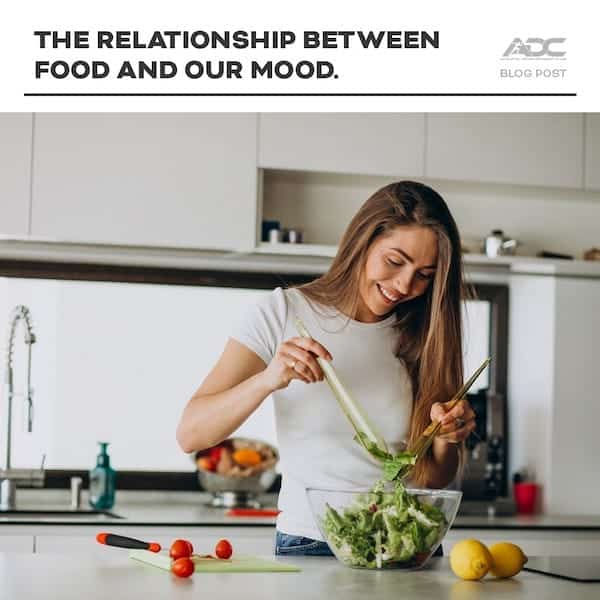It is safe to say that our emotions play a part in the foods that we consume, but also how the foods that we eat impact our mood. We can all relate to that state where we feel stressed out, perhaps slightly anxious or depressed and as a result, turn to food. In the short term, stress can shut down appetite. The nervous system sends messages to the adrenal glands atop the kidneys to pump out the hormone epinephrine (also known as adrenaline). Epinephrine helps trigger the body’s fight-or-flight response, a revved-up physiological state that temporarily puts eating on hold.
But if stress persists, it’s a different story. The adrenal glands release another hormone called cortisol, and cortisol increases appetite and may also ramp up motivation in general, including the motivation to eat. Once a stressful episode is over, cortisol levels should fall, but if the stress doesn’t go away — or if a person’s stress response gets stuck in the “on” position — cortisol may stay elevated.
Stress also seems to affect food preferences. Numerous studies — granted, many of them in animals — have shown that physical or emotional distress increases the intake of food high in fat, sugar, or both. High cortisol levels, in combination with high insulin levels, may be responsible. Other research suggests that ghrelin, a “hunger hormone,” may have a role.
Once ingested, fat- and sugar-filled foods seem to have a feedback effect that dampens stress-related responses and emotions. These foods really are “comfort” foods in that they seem to counteract stress — and this may contribute to people’s stress-induced craving for those foods.
Furthermore, while it was long thought that we crave sweet foods because of the taste, this in fact is inaccurate. Rather, we actually have neural sensors in our Gut that sense the presence of Sugar and communicate this information to our Brain through the Vagus nerve. This stimulates the release of the ‘feel good’ neurochemical Dopamine which makes us want more of that thing. This pathway is so powerful that Scientists have actually done studies whereby they completely numb the sweet taste in someone’s mouth, blindfold them so that they don’t know what they are eating, and feed them either a sugary food or a non-sugary food. What they found was astonishing…the person who ingested the sugary food actually craved more of it, independent of its sweet taste. While Sugar, or even more broadly Carbohydrates get a bad rap, Glucose is a preferred fuel source for the body. The problems arise when we struggle to regulate our behavior around eating Sugar and consume it in excess.
Another common misconception when it comes to Carbohydrates is that they shouldn’t be consumed in the evening. There is mounting research now to show that eating a meal rich in Carbs and Protein actually decreases the time it takes to fall asleep and overall sleep quality. Starchy carbohydrates in particular and also some Meats which are rich in an Amino acid called Tryptophan actually stimulate the release of Serotonin. This Serotonin release promotes a calm, content state, and has shown to promote sleepiness in the evening. Even eating Carbohydrates with a higher Glycaemic index (i.e. which raises blood sugar quickly), especially when eaten around 4 hours prior to sleep has shown benefits to sleeping.
Overeating, of course, isn’t the only stress-related behavior that can add pounds. Stressed people also lose sleep, exercise less, and drink more alcohol, all of which can contribute to excess weight.
Some research suggests a gender difference in stress-coping behavior, with women being more likely to turn to food and men to alcohol or smoking. And a Finnish study that included over 5,000 men and women showed that obesity was associated with stress-related eating in women but not in men.
Harvard researchers have reported that stress from work and other sorts of problems correlates with weight gain, but only in those who were overweight at the beginning of the study period. One theory is that overweight people have elevated insulin levels, and stress-related weight gain is more likely to occur in the presence of high insulin.
How much cortisol people produce in response to stress may also factor into the stress–weight gain equation. In 2007, British researchers designed an ingenious study that showed that people who responded to stress with high cortisol levels in an experimental setting were more likely to snack in response to daily hassles in their regular lives than low-cortisol responders.
How to relieve stress without overeating
When stress affects someone’s appetite and waistline, the individual can forestall further weight gain by ridding the refrigerator and cupboards of high-fat, sugary foods. Keeping those “comfort foods” handy is just inviting trouble.
Here are some other suggestions for countering stress:
Meditation. Countless studies show that meditation reduces stress, although much of the research has focused on high blood pressure and heart disease. Meditation may also help people become more mindful of food choices. With practice, a person may be able to pay better attention to the impulse to grab a fat- and sugar-loaded comfort food and inhibit the impulse.
Exercise. While cortisol levels vary depending on the intensity and duration of exercise, overall exercise can blunt some of the negative effects of stress. Some activities, such as yoga and tai chi, have elements of both exercise and meditation.
Social support. Friends, family, and other sources of social support seem to have a buffering effect on the stress that people experience. For example, research suggests that people working in stressful situations, like hospital emergency departments, have better mental health if they have adequate social support. But even people who live and work in situations where the stakes aren’t as high need help from time to time from friends and family.
Nutrition & Supplementation. As we have seen the foods, we eat have a significant impact on our mood. But which health-promoting foods, in particular, can help to boost your mood? One of the main foods which has shown profound benefits to our mood is fatty fish such as Salmon. This due to the high levels of Omega 3 fatty acids that they have. Omega-3 fatty acids are a group of essential fats that you must obtain through your diet because your body can’t produce them on its own. Having a greater Omega 3 – 6 ratio has been shown in countless Scientific studies to alleviate Depression. In particular, studies whereby people who experience Depression supplement with EPA, a type of omega 3 fatty acid, for a period of time, show significant improvements. Interestingly, it is thought that some of these benefits are down to the effect that EPA supplementation has on HRV (Heart rate variability). HRV refers to the variation in time interval between heartbeats. A higher HRV means more variation in the time between heartbeats which denotes a greater resiliency to stress and less depression or anxiety.
So, the connection between the food we eat, and our state is a strong one. Not only does our state predispose us to crave certain foods, but the food we eat also affects how we feel. With a better understanding of this, we can make more informed decisions about what and when to have certain foods, as well as when and why we may be susceptible to certain cravings.

